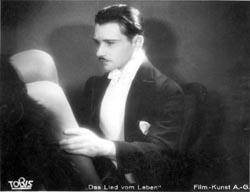| Edition
of German Film Censorship Documents 1920-1938
The Deutsches
Filminstitut-DIF, which is a member of the Fédération Internationale
des Archives du Film (FIAF), edits a collection of film censorship documents
from the Film-Oberprüfstelle Berlin. This special institution, a
department of the Ministery of the Interior, was founded 1920 as final
arbitrator of whether a film could or could not be distributed and shown
throughout Germany. The institution was closed in 1938. During the
„Third Reich" film censorship changed from the practice of censorship
of finished films into a scrutiny, by the Ministry of Propaganda, of the
entire process of film production. During the Weimar Republic both producers/distributers
and the several countries of the German Reich had the legal right to protest
against licences or bans expressed by the two censorship institutions
in Berlin („Filmprüfstelle Berlin") and Munich („Filmprüfstelle
München"). These licences constituted the basis for distributing
and screening pictures in public cinemas. Some of the censorship processes
lasted for over a year e.g. in the famous cases of S.M.Eisensteins
„Panzerkreuzer Potemkin" (1925/26), G.W.Pabsts
„Die freudlose Gasse" (1925) or S.Dudows and Bert Brechts „Kuhle Wampe
oder Wem gehört die Welt?" (1932/33). During the court of the Filmoberprüfstelle
discussed licences, bans or shortening advices local police stations were
allowed to stop the performance of a film.
The collection
that is now edited contains documents on 844 films produced and distributed between
1918 and 1938. The facsimiles of the documents are edited in PDF-files. Each film
in this edition is documented with information on variations of the title, with
credits, cast and censorship data (length, date of the license, number of the
license, date of premiere). The archive gives an excellent impression of which
sequences of the films (especially silent films) were to be edited out or which
films were banned. By reading these documents it is possible to study the structure
of the argument for or against a license. They also give an impression of how
a democratic institution step by step tends to identify itself with structures
of totalitarianism.
In
many cases the documents tell nearly the whole story of the film therefore they
can also be used to identify unknown films saved by international archives and,
in addition to this, can tell film researchers something about the special tradition
of existing films. Last but not least they are relevant for restoration projects.
Some of the documents, e.g. the decisions concerning L. Milestones „All Quiet
on the Western Front/Im Westen nichts Neues" (1930) came from the federal archives
of Sachsen and Bavaria; as far as it was nessessary to complete our own documents
to reconstruct a censorship process at the whole, we integrate them into our edition.
In addition
to the general edition of the previously mentioned documents we have selected
a representative corpus of 25 films (German, American, Russian and French productions)
- famous cases or canonic works of the film history. These titles are exposed
by a representative documentation of the contemporary reviews (critical texts
published in newspapers and film journals), by stills saved in our own collection,
short descriptions of the plot and biographical portraits of the directors.
An essay concerning the general
German practice of film censorship in this period, the discussion of the legal
basis of censorship in the first German democracy and a bibliography on film censorship
in Germany will complete our edition. Ursula
von Keitz
project
leader A list of the
films is available. Further
Informations:
Claudia
Dillmann, Tel. 069/961 220-21
Ursula
von Keitz, Tel. 069/961 220-11 |
